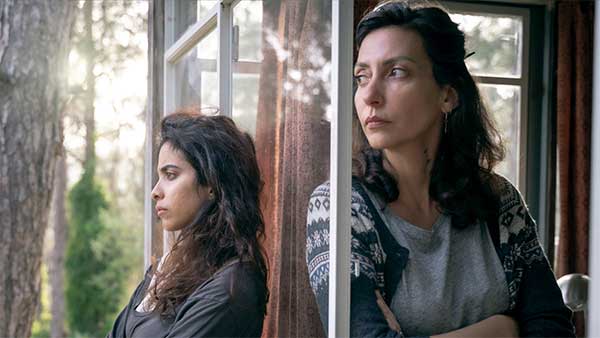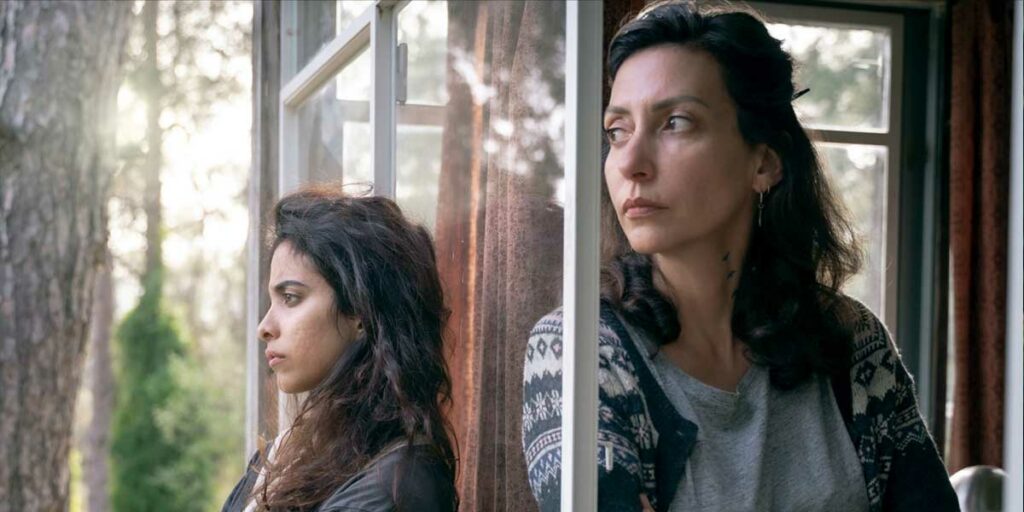The Future is a high concept sci-fi drama that collapses under the weight of grand ambitions.
In the world that The Future director and scriptwriter Noam Kaplan envisions, there is no terrorism. It’s quashed early, before the terrorist activity can take place, by The Future algorithm. The concept of precognitive abolition of terrorist acts harkens back to the likes of Steven Spielberg’s sci-fi Minority Report, which tackled themes of determinism and free will. The Future tackles themes similarly, in that it tries to propose motherhood as an idea that can’t be predetermined through science, placing The Future somewhere between the 2002 sci-fi epic and the likes of Marjorie Prime. Sadly, these themes are poignant only in proposal, as the scattered monotony of The Future’s delivery robs the film of any intriguing power it might have.
In contemporary Israel, terrorism seemingly doesn’t happen. This is in part because of profiler Dr Nurit Bloch (Reymonde Ansellem), who with help from the Shalom Harman Peace Institute, has created an algorithm that identifies people who plan on carrying out terrorist attacks. The algorithm correlates online posting with past acts of terror to decide who will be the ‘future suicide bomber’, ‘future knifer’ and ‘future soul terrorist’. When a young Palestinian woman Yafa (Samar Qupty) kills the Israeli minister for Space and Tourism, a gaping flaw in Bloch’s algorithm is unearthed. To work out how her algorithm failed, Bloch – of Israeli descent and privilege – must interrogate Yafa, a sneeringly frowned upon Palestinian woman, whose Palestinian tap water apparently tastes like shit.
The two spend the film acclimating to each other’s views on the world in a safe house, hardly ever retreating from the chamber piece-esque thriller it threatens to be. The film is backdropped by a countdown of a spacecraft named Hope’s impending arrival on the moon, and Bloch’s pursuit of becoming a mother by way of fit, marathon running surrogate Maor (Dar Zuzovsky), along with some discussion around the Palestine-Israel conflict that may only resonate with those more involved and personally invested.
It should be noted that this idea– and bloch’s involvement – of being able to prevent terrorist attacks is only broached through a strangely concocted advertisement that is innocuously and randomly plopped in around the 20-minute mark, highlighting how scattered the film feels amidst all of its grandiose topics.

The problem that emerges from within the idealised world that The Future exists in is that this conflict shouldn’t exist. Kaplan’s discussion within the film around abolishing the conflict doesn’t work, when the concept encroached negates its existence. The act of terror by self-admitted freedom fighter Yafa is described as something a voice told her to do in the moment, rather than premeditated, but the conflict between Israel and Palestine is constantly ebbing at the seams of the character dynamics within the film. Which begs the question that is never approached by Israeli director Kaplan of how much blame is to be put on Israel for its encroachment of Palestinian land, water and – as the mother of Yafa highlights – space, and if – in this fictitious world – Israel hoard The Future technology for themselves. All of these ideas around the modern world, the future land that will be seceded to offspring and liberation – from the viewpoint of a privileged Israelite – are proposed, but they’re less half baked and more incomplete. The third act, especially, feels resoundingly empty with the final 10 minutes landing without so much as a splash into the deep sea of themes that Kaplan wants his film to speak on.
The Future is a film with complex ideas, but as an outsider to the Israel Palestine conflict, the emotional nuance that underlies discussion – such as around Hebrew names resembling flowers – doesn’t translate across in a meaningful way, ultimately leaving the film feeling like an abridged version of an interesting story. The high concept ideas of The Future executed in this low-fi way are unfortunately squandered potential, as the abreaction and ambiguity of the characters don’t deliver enough of a tangible resolution to make this film feel like a complete story.
The Future premiered at the Tribeca Film Festival on June 10, 2023. Read our list of 15 films to watch at the 2023 Tribeca Film Festival!

